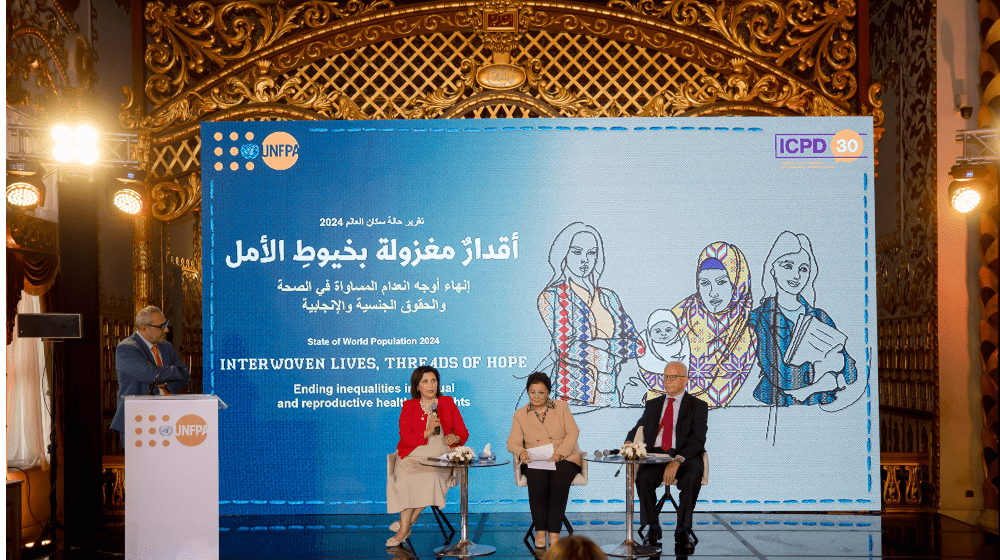Cairo, Egypt- 11 July 2024 – Sweeping global gains in sexual and reproductive health and rights over the last thirty years are marred by an ugly truth – millions of women and girls have not benefited because of who they are or where they were born, according to the 2024 State of World Population report, released today by United Nations Population Fund (UNFPA) Arab States Regional office in Cairo.
Today, the UNFPA Regional Office for the Arab States and the UNFPA Country Office in Egypt launched the report, commemorated World Population Day and launched the Arab Media Declaration on Population and Development in Cairo, Egypt.
Entitled “Interwoven Lives, Threads of Hope: Ending inequalities in sexual and reproductive health and rights”, the report highlights the role racism, sexism and other forms of discrimination continue to play in blocking broad gains in sexual and reproductive health for women and girls. The data is damning. Women and girls who are impoverished, belong to ethnic, racial and indigenous minority groups, or are trapped in conflict settings, are more likely to die or experience health related complications because they lack access to timely health care.
The statistics are shocking: according to the SWOP 2024 report over half of all preventable maternal deaths are estimated to occur in countries with humanitarian crises and conflicts – that’s nearly 500 deaths per day. Women with disabilities are up to 10 times more likely to experience gender-based violence than their peers without disabilities.
2024 marks the thirtieth anniversary of the International Conference on Population and Development (ICPD), held in Cairo – a landmark moment in which 179 governments committed to placing sexual and reproductive health and rights at the core of sustainable development.
”In the Arab region, countries that prioritize women and girls in their development efforts have made significant progress in the face of polycrisis and emerging megatrends” said Ms. Laila Baker, UNFPA Arab states Regional Director: “Indicators such as life expectancy and maternal mortality have improved, while women enjoy greater autonomy and decision-making power. Family planning services and modern contraceptives have become more accessible, leading to a decrease in teenage pregnancy”.
Although there has been progress towards the ICPD vision, the sustainability of the gains is in danger. Millions of women and girls remain far behind, and progress is slowing or stalled on key measures: 800 women die every day giving birth, unchanged since 2016; a quarter of women cannot say no to sex with their partner and nearly one in 10 women cannot make their own decisions about contraception. In 40 percent of countries with data, women’s bodily autonomy is diminishing.
The Arab region still faces substantial inequality. The region exhibits the lowest global female economic participation rate at 26%, highlighting a significant gender gap in the workforce. While maternal mortality has shown improvement, disparities persist among different countries. Additionally, issues such as unmet need for family planning, gender-based violence, child marriage, and female genital mutilation continue to affect millions of girls in the region, posing significant challenges to achieving gender equality.
“To address inequalities, health systems must provide empowering services and respond to diversity and rights. Worsening inequalities mean that we are adding to the numbers of people
left behind. Lasting equality requires tackling systemic economic, social, and political inequalities,” added Ms. Baker.
On the occasion of World Population Day, a panel discussion was held on “Accelerating achievements and leveraging investments in reproductive health and family planning” based on the findings of the recently launched investment case towards ending unmet need for family planning in Egypt.
The discussions explored the interrelationship between health, especially sexual and reproductive health, social protection resilience and financing to overcome existing inequalities and accelerate the ICPD agenda.
The panel discussion was moderated Germaine Haddad, UNFPA Representative in Egypt a.i., with the participation of Dr. Abla Al-Alfi, Deputy Minister of Health and Population for Population Affairs, and Dr. Ashraf El-Arabi, President of the Institute of National Planning, Elena Panova, UN Resident Coordinator in Egypt, Alex Segura, Senior Resident Representative of the International Monetary Fund in Egypt, and Dr. Ahmed Seyam, Deputy Chief Executive Officer of the Health Insurance Authority.
The participants recommended giving priority to investing in reproductive health and family planning because they have a significant impact on economic and social progress by enhancing educational and employment opportunities for women, thus achieving a positive impact on GDP growth and reducing long-term public expenditures associated with unplanned pregnancy, health care, and social support. To achieve great investment returns.
At the event, a Regional Media Declaration in support of the ICPD Programme of Action was unveiled. The declaration was unanimously adopted by the members of the Regional ICDP Media Coalition to bolster efforts aimed at implementing the 1994 ICPD Programme of Action and the 2013 Cairo Declaration.
The members of the Coalition recommitted themselves to upholding various international agreements, including the ICPD Programme of Action, the Cairo Declaration, the 2030 Agenda for Sustainable Development, and othersThese agreements recognize the fundamental rights to dignity, equality, sexual and reproductive health, reproductive rights, and the autonomy of every woman and girl to make informed decisions about their lives in all contexts: development, peacebuilding process, and different humanitarian settings.
In light of its critical role in fostering sustainable development , prosperity, and well-being in all societies, the Coalition emphasized its commitment to advocating for investments in women and girls across the Arab region.


